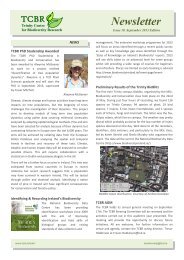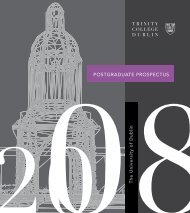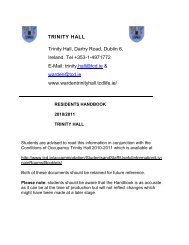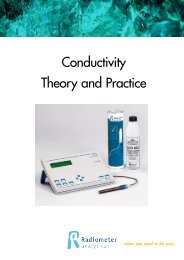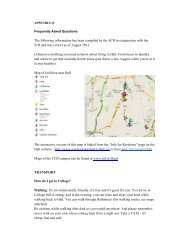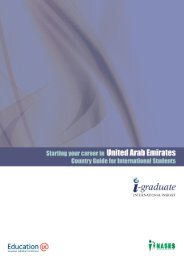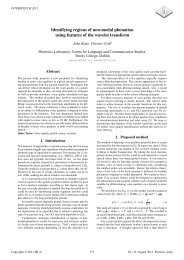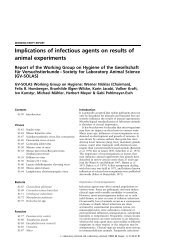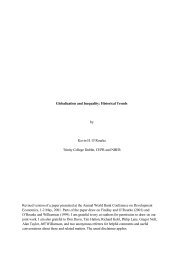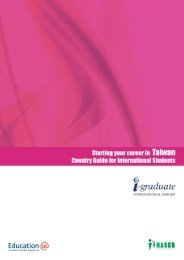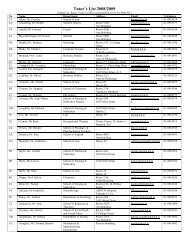Conference Programme (PDF, 1019KB) - Trinity College Dublin
Conference Programme (PDF, 1019KB) - Trinity College Dublin
Conference Programme (PDF, 1019KB) - Trinity College Dublin
Create successful ePaper yourself
Turn your PDF publications into a flip-book with our unique Google optimized e-Paper software.
abstracts by stream and session<br />
The Secretary General of the Department of Justice, Equality and Law Reform, acknowledged Ireland’s obligation under international<br />
human rights law to “house homeless people who have pitched up on our shores” (Seán Aylward to the Oireachtas Public Accounts<br />
Committee in October 2009), but the Department has been careful not to create an economic “pull factor” (Noel Dowling in Ní Shé et al<br />
2007). Instead it has tried to strike a balance between fulfilling Ireland’s obligations under international treaties which it has ratified, and<br />
ensuring that a deterrent is in place to discourage people from coming to Ireland to seek asylum.<br />
While the policy alleviated the housing shortage in the Eastern Health Board area, it has had implications for those living in the<br />
accommodation provided as it is often seen as inadequate and not a suitable place to raise children. Most of the accommodation is full<br />
board which means that people cannot cook for themselves; children never see their parents cook; meals are at set times.<br />
Furthermore, direct provision residents are prohibited from working by law. Ireland is one of only two European Union member states<br />
which have not signed the Reception Directive which gives the right to work to asylum seekers after a specified period of time. The only<br />
income a direct provision resident receives is the weekly direct provision allowance of €19.10 for an adult and €9.60 for a child. It is the<br />
only social welfare payment not to have increased since it was introduced in 2000. The prohibition on working, and the dependency on the<br />
social welfare system, adds to the misconception that direct provision residents are lazy and want to avail of the Irish State’s generous<br />
social welfare system when in fact over the past ten years the Government has put in place a number of measures to limit access to<br />
social welfare payments. In 2003 asylum seekers could no longer access rent supplement and live in independent accommodation. In<br />
2004, the Habitual Residence Condition (HRC) was introduced to discourage “welfare tourism” from the EU accession states. Following<br />
this introduction, the Department of Social and Family Affairs operated a blanket ban on asylum seekers or direct provision residents who<br />
applied for any social welfare payment other than the direct provision allowance and clothing allowances in the form of Exceptional Needs<br />
Payments which may be granted at the discretion of the Community Welfare Officer.<br />
In 2009, FLAC won a number of cases in which the Chief Social Welfare Appeals Officer held that a person in direct provision could satisfy<br />
the HRC. The final five decisions were given in December 2009 but a week later the Social Welfare and Pensions (No 2) Bill 2009 was<br />
guillotined through the Dáil and enacted into law without proper debate on the issues. This means that no direct provision resident can<br />
now satisfy the HRC and avail of social welfare payments.<br />
The way in which the Government has responded to its obligations to provide for those seeking refugee status, humanitarian leave to<br />
remain or subsidiary protection, raises questions as to the extent to which their responsibilities are fulfilled. On the one hand States are<br />
given some leeway in relation to immigration control but they still have to comply with the treaty rights to which they are bound through<br />
the ratification of international instruments including the Universal Declaration of Human Rights (UDHR), the International Covenant on<br />
Civil and Political Rights (ICCPR), the International Covenant on Economic, Social and Cultural Rights (ICESCR) and the European<br />
Convention on Human Rights (ECHR). It is a matter of striking a balance between both and any response to an increase in people coming<br />
into the country must be proportionate.<br />
It seems policies such as the direct provision and dispersal system, as well as the introduction of the Habitual Residence Condition are<br />
being used as a deterrent to discourage people from coming to Ireland. In terms of individuals or families fleeing persecution in their own<br />
State, there is no evidence to suggest that they have researched the destination before they leave and have chosen it on the basis of the<br />
payments they may receive as demonstrated in a report by the British Refugee Council published in January 2010. Instead asylum<br />
seekers should be treated as refugees awaiting a confirmation of their status, rather than treated with suspicion and disrespect.<br />
SESSION 2d Managing Migration in Ireland<br />
Policy Paradoxes: The State and the Causes of Trafficking for Forced Labour in Ireland<br />
*Gillian Wylie, <strong>Trinity</strong> <strong>College</strong> <strong>Dublin</strong>, Ireland<br />
Deirdre Coughlan, <strong>Trinity</strong> <strong>College</strong> <strong>Dublin</strong>, Ireland<br />
Research carried out in Ireland under the ESF project on trafficking for forced labour, revealed that there were at least 50 cases of TFL in<br />
Ireland between 1999 and 2007. Workers from around the globe were found to be exploited in the construction, farming, restaurant and<br />
domestic work sectors.<br />
Ireland adopted anti-trafficking legislation in 2008 and now has the ‘law, institutional capacity and consultative mechanisms’ (Plant, 2009)<br />
necessary to address human trafficking. The emphasis of this law is on defining trafficking as a form of organised crime, which<br />
necessitates a strongly prosecutorial response by the state. Ironically however, while the Irish state has adopted anti-trafficking policies,<br />
other aspects of its policy regime continue to create the underlying causes of trafficking and migrant worker exploitation. Over the last<br />
years, Ireland’s migration and employment regimes have been evolving with the intent of both squeezing out migrant workers from<br />
non-EEA countries and funnelling migrant workers from EU accession states into low-skilled, poorly regulated sectors (Ruhr and Quinn,<br />
2009). Such policies create the context for human trafficking, undocumented migration and workplace exploitation.<br />
Recognising these on-going dilemmas, NGOs and Trade Unions in Ireland have campaigned to protect exploited migrant workers. There<br />
have been some successes in this respect, particularly the bridging visa campaign and opposition to a government proposal to reduce the<br />
amount of time available for migrants who are made redundant to find new work. However, such campaigns work incrementally and have<br />
focused first on protecting the rights of those who legally entered Ireland. A more profound response to trafficking for forced labour will<br />
require addressing the dissonance between the state’s anti-trafficking commitment and its policy regimes which foster exploitative<br />
practices.<br />
63



